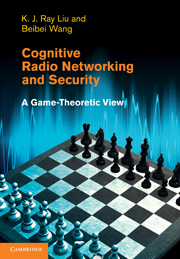Preface
Published online by Cambridge University Press: 06 December 2010
Summary
Recent increases in demand for cognitive radio technology have driven researchers and technologists to rethink the implications of the traditional engineering designs and approaches to communications and networking. One issue is that the traditional thinking is that one should try to have more bandwidth, more resources, and more of everything, while we have come to the realization that the problem is not that we do not have enough bandwidth or resources. It is rather that the bandwidth/resource utilization rates in many cases are too low. For example, the TV bandwidth utilization nowadays in the USA is less than 6%, which is quite similar to that in most developed countries. So why continue wanting to obtain more new bandwidth when it is indeed a scarce commodity already? Why not just utilize the wasted resource in a more effective way?
Another reconsideration is that often one can find the optimization tools and solutions employed in engineering problems being too rigid, without offering much flexibility, adaptation, and learning. The super highway is a typical example in that, during traffic hours, one direction is completely jammed with bumper-to-bumper cars, while the other direction has few cars with mostly empty four-lane way. That is almost the case for networking as well. Rigid, inflexible protocols and strategies often leave wasted resources that could otherwise be efficiently utilized by others. It was recognized that traditional communication and networking paradigms have taken little or no situational information into consideration by offering cognitive processing, reasoning, learning, and adaptation.
- Type
- Chapter
- Information
- Cognitive Radio Networking and SecurityA Game-Theoretic View, pp. xiii - xviPublisher: Cambridge University PressPrint publication year: 2010



